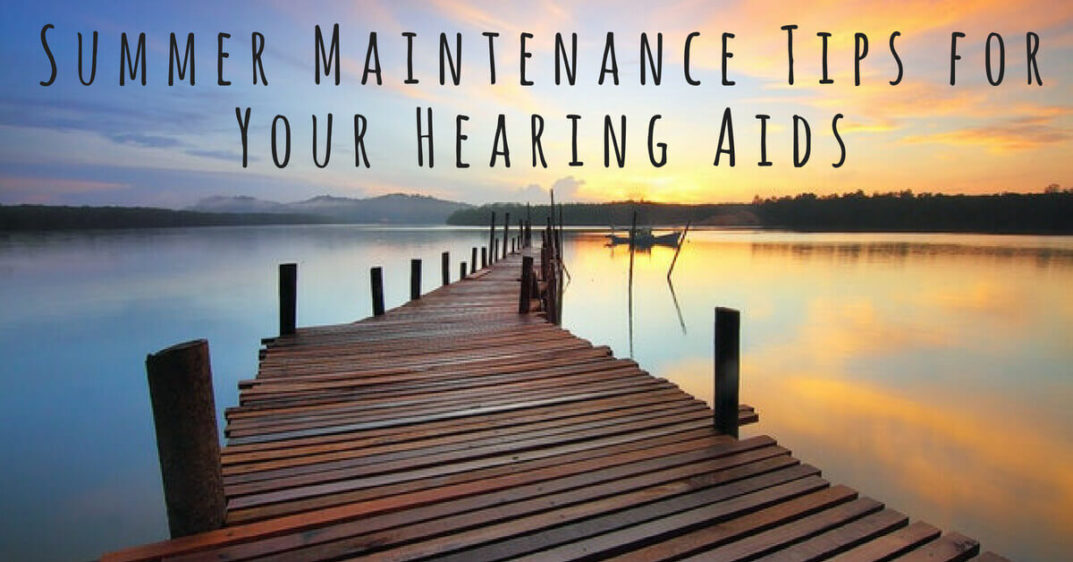What’s your favorite summer sound? Is it the chirp of crickets, 4th of July fireworks, thunderstorms, boats on the water, a bonfire crackling at an outdoor party, or waves crashing on the beach?
Summer is a sweet time of year for the senses, a time to live in the present and enjoy the simple things. If you have hearing loss, knowing how to take good care of your hearing aids in the summer will ensure you get to enjoy the sounds, socializing, and everything else this wonderful season has to offer.
Here are few tips for taking care of your hearing aids in these hot, humid months.
Protecting your aids from moisture:
Perspiration, humidity, water from pools, lakes or the sea — all of these forms of moisture can cause damage to a hearing aid, harming the microphone or corroding battery points.
What to do:
- 1. Try your best to avoid getting your hearing aids wet.
If you are taking part in an outdoor activity that involves water, such as swimming, it is recommended to remove your hearing devices completely. Salt water is particularly harmful to hearing aids as it leaves crystals behind when it evaporates, and these crystals can cause damage to the device’s components.
If you are not swimming but near the pool area, look for a chair that is farther away from the water and the diving boards. To be extra safe, keep your hearing aids in a waterproof case while lounging poolside–just make sure the case is brightly colored so you don’t forget your hearing aids when you leave.
- 2. Invest in an overnight dehumidifying kit
Moisture buildup can happen easily in the summer, even if you’re not in contact with water. Sweat and humidity are enemies to hearing aids, so invest in an overnight drying kit to remove excess moisture at night. This kit will also come in handy if your hearing aids are accidentally exposed to water.
Protecting your hearing aids from debris:
Sand, sprays (such as sunscreen and bug spray) and allergens (such as pollen) can cause a hearing aid to malfunction by clogging the microphones, tubing and other important parts. These substances can also be corrosive and cause permanent damage to a hearing aid. Here’s how to keep your hearing aids clean and protected.
What to do:
- 1. Never touch your hearing aids with sandy hands.
If you need to touch your hearing aids for any reason while on the beach, make sure your hands are completely clean and dry first. And remember, sand gets everywhere, so remove your hearing aids if you want to lie down on the sand. You may also want to consider neoprene hearing aid sleeves that protect hearing aids from sand, dust and other debris.
- 2. Remove hearing aids before applying products like sunscreen.
It might seem like an unnecessary step but removing your hearing devices before applying any products or sprays will ensure their longevity and functionality. These sticky products can clog your hearing aid components, so make sure any products you applied are dry before re-inserting your devices. If you accidentally spray your hearing aids with bug spray or sunscreen, take them out and clean them thoroughly with the tools provided by your hearing care professional.
- 3. Clean with a soft, dry cloth to avoid pollen buildup.
Pollen is often a problem in the summer for hearing aid wearers, as it can clog microphone ports and cause the devices to malfunction. Other summer allergens include mold, which reaches its highpoint in July, and ragweed, which is most abundant in August. In the case of allergen buildup, cleaning with a soft dry cloth can help to remove debris. The covers of the ports can also be easily replaced by your local hearing care professional.
Protecting your hearing aids from heat:
We can’t talk about summer without mentioning heat. Summer wouldn’t be same without all the hours of sunlight, but this season’s soaring heat can also be destructive. Here are a few tips to protect your hearing devices from this harsh element.
The plastic casings on your device can melt under direct sunlight. Heat can also damage the batteries and can cause shorter battery life or may cause complete failure due to damage altogether.
What to do:
- 1. Avoid leaving your hearing aids in the car
On the hottest days, temperatures in a car can rise to as high as 150 degrees, causing significant damage to both the casings and the batteries.
- 2. Store your hearing aids in the shade
If you are outside for an extended period of time, and you remove your hearing aids, make sure to keep them in a safe, cool spot in the shade.
Make the most of summer’s opportunities for outdoor fun, but don’t forget to look after your hearing aids as well. If you need any additional advice about hearing aid care techniques or accessories, Comprehensive Ear and Hearing would be happy to help.


